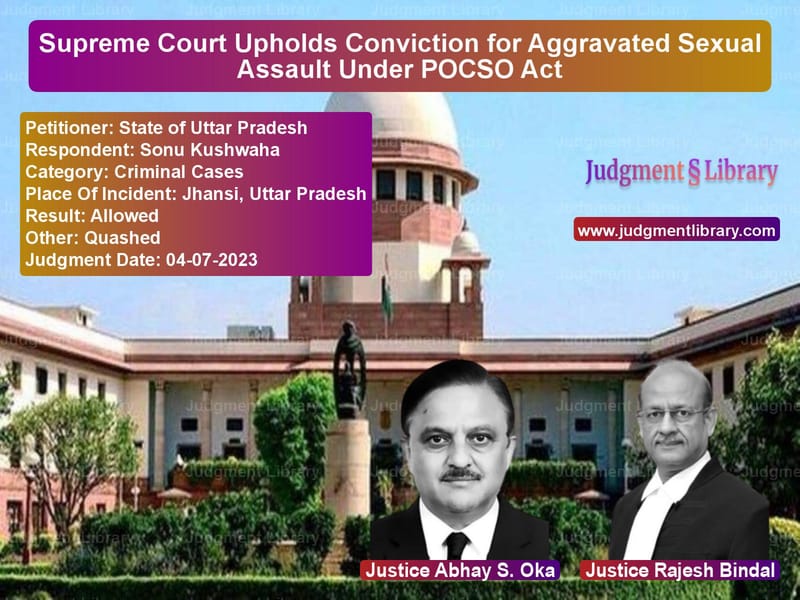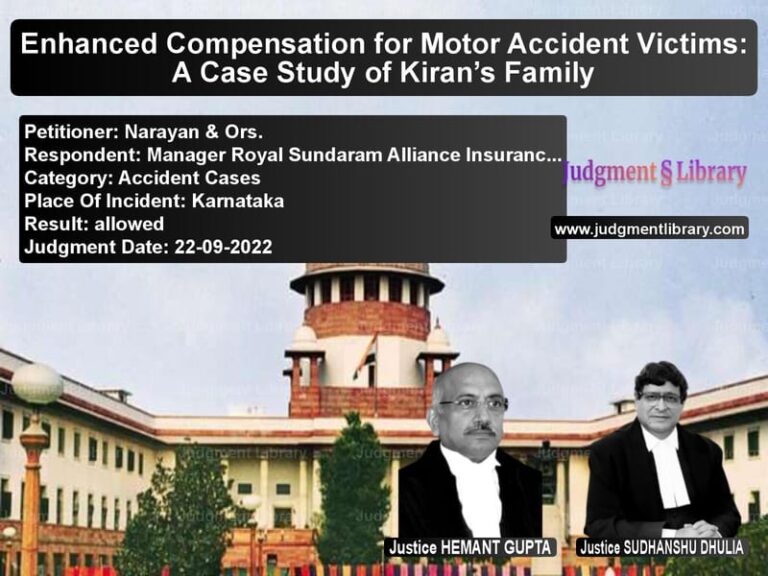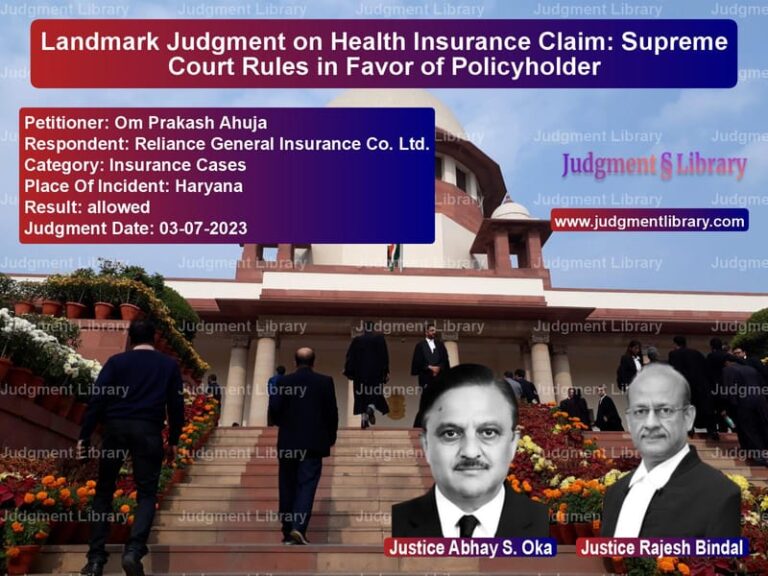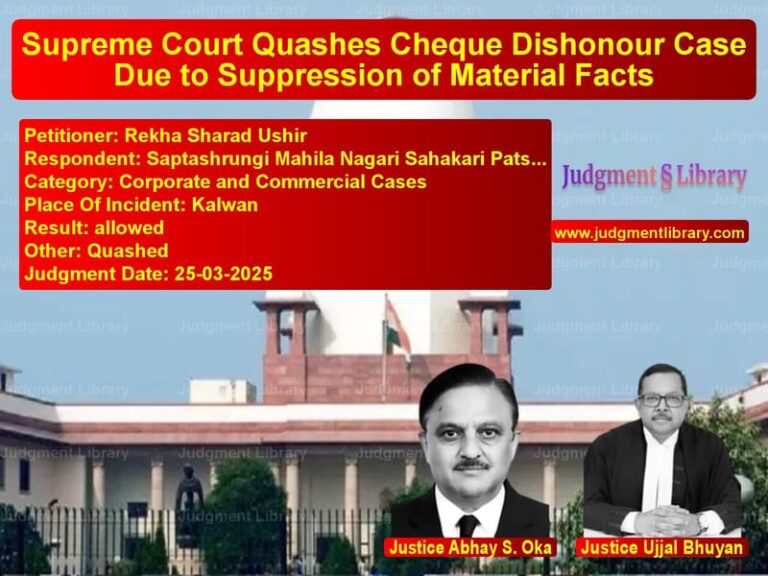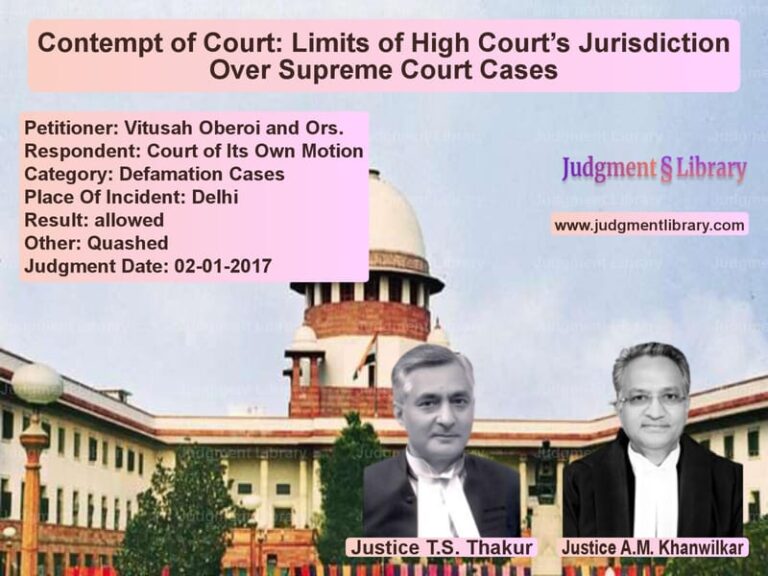Supreme Court Upholds Conviction for Aggravated Sexual Assault Under POCSO Act
The case of State of Uttar Pradesh vs. Sonu Kushwaha raises significant legal questions concerning the interpretation and application of the Protection of Children from Sexual Offences (POCSO) Act, 2012. The Supreme Court had to determine whether the accused’s act constituted aggravated penetrative sexual assault under Section 6 of the Act. The ruling emphasized the severity of crimes against children and reinforced the statutory mandate of stringent punishment.
Background of the Case
The case originated when the accused, Sonu Kushwaha, was charged with offenses under:
- Section 377 (unnatural offenses) of the Indian Penal Code (IPC)
- Section 506 (criminal intimidation) of the IPC
- Section 5 read with Section 6 of the POCSO Act
The Special Judge (POCSO Court), Jhansi, convicted the accused and sentenced him to:
- 10 years of rigorous imprisonment for the offense under Section 6 of the POCSO Act, along with a fine of Rs. 5,000.
- 7 years of rigorous imprisonment for the offense under Section 377 IPC.
- 1 year of rigorous imprisonment for the offense under Section 506 IPC.
On appeal, the Allahabad High Court modified the conviction, reducing it to penetrative sexual assault under Section 4 of the POCSO Act instead of aggravated penetrative sexual assault under Section 6. The High Court subsequently reduced the sentence to 7 years of imprisonment. The State of Uttar Pradesh challenged this decision in the Supreme Court.
Read also: https://judgmentlibrary.com/supreme-court-modifies-conviction-in-kerala-school-bus-incident/
Facts of the Case
The prosecution’s case was based on an FIR filed by the victim’s father on March 26, 2016. The complaint alleged that on March 22, 2016, the accused took the victim (a 10-year-old boy) to a temple, gave him Rs. 20, and forced him to engage in a sexual act. The victim disclosed the incident to his family, leading to the lodging of the complaint.
The High Court, while convicting the accused, observed:
“The proved facts of the case are that the appellant put his penis into the mouth of the victim aged about 10 years and discharged semen therein.”
Arguments by the Appellant (State of Uttar Pradesh)
The State contended that:
- The accused committed penetrative sexual assault on a child below 12 years, which falls under the definition of aggravated penetrative sexual assault under Section 5(m) of the POCSO Act.
- The High Court erroneously downgraded the conviction from Section 6 to Section 4 of the POCSO Act.
- As per the statutory mandate, a minimum punishment of 10 years must be imposed for aggravated penetrative sexual assault.
Arguments by the Respondent (Sonu Kushwaha)
The defense argued that:
- The accused had already undergone 7 years of imprisonment, and he had reformed.
- He had moved ahead in life, had recently married, and sending him back to prison would be unjust.
- The High Court had correctly reduced the sentence considering these factors.
Supreme Court’s Analysis and Ruling
The Supreme Court set aside the High Court’s ruling and restored the conviction under Section 6 of the POCSO Act. The Court made the following key observations:
- Section 3(a) of the POCSO Act defines penetrative sexual assault as an act where a person “penetrates his penis, to any extent, into the vagina, mouth, urethra or anus of a child.” The act committed by the accused squarely falls within this definition.
- Section 5(m) of the POCSO Act states that any penetrative sexual assault on a child below 12 years constitutes aggravated penetrative sexual assault.
- The High Court erred in reducing the offense to Section 4 when the statutory language clearly mandates that penetration on a child below 12 years is aggravated sexual assault.
The Court stated:
“Considering the finding recorded in paragraph 16 of the impugned judgment, the respondent has committed an offense of aggravated penetrative sexual assault as he has committed penetrative sexual assault on a child below twelve years. Clause (m) of Section 5 is attracted in this case.”
Impact of the Ruling
- The judgment reaffirms that courts must strictly adhere to statutory provisions when imposing sentences under the POCSO Act.
- It underscores that leniency cannot be shown in cases of child sexual abuse, even if the accused has undergone partial imprisonment or claims reformation.
- The ruling ensures that victims of child sexual abuse receive justice as per the intent of the law.
Final Judgment
The Supreme Court ruled:
- The High Court’s modification of the conviction and sentence is set aside.
- The Special Judge’s judgment convicting the accused under Section 6 of the POCSO Act is restored.
- The accused shall serve the remaining portion of his 10-year sentence.
- If he does not surrender within one month, the trial court must issue a non-bailable warrant for his arrest.
The Court emphasized:
“Apart from the fact that the law provides for a minimum sentence, the crime committed by the respondent is very gruesome which calls for very stringent punishment. The impact of the obnoxious act on the mind of the victim-child will be life-long.”
Conclusion
The ruling in State of U.P. vs. Sonu Kushwaha sets an important precedent for child sexual abuse cases. By ensuring that statutory punishments are imposed without leniency, the Supreme Court reaffirmed its commitment to protecting children and enforcing stringent legal consequences against perpetrators.
Petitioner Name: State of Uttar Pradesh.Respondent Name: Sonu Kushwaha.Judgment By: Justice Abhay S. Oka, Justice Rajesh Bindal.Place Of Incident: Jhansi, Uttar Pradesh.Judgment Date: 04-07-2023.
Don’t miss out on the full details! Download the complete judgment in PDF format below and gain valuable insights instantly!
Download Judgment: state-of-uttar-prade-vs-sonu-kushwaha-supreme-court-of-india-judgment-dated-04-07-2023.pdf
Directly Download Judgment: Directly download this Judgment
See all petitions in SC/ST Act Case
See all petitions in Bail and Anticipatory Bail
See all petitions in Juvenile Justice
See all petitions in Judgment by Abhay S. Oka
See all petitions in Judgment by Rajesh Bindal
See all petitions in allowed
See all petitions in Quashed
See all petitions in supreme court of India judgments July 2023
See all petitions in 2023 judgments
See all posts in Criminal Cases Category
See all allowed petitions in Criminal Cases Category
See all Dismissed petitions in Criminal Cases Category
See all partially allowed petitions in Criminal Cases Category

